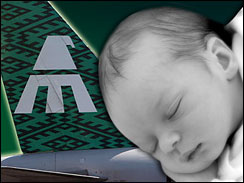
|  |  |  Americas & Beyond | January 2009 Americas & Beyond | January 2009  
In Weak U.S. Economy, Mexican-American Dual Citizenship Increases
 Claudia Núñez - La Opinión Claudia Núñez - La Opinión
go to original


| | A 42-year-old woman gave birth to a healthy girl in 2006 aboard a plane destined for O'Hare International Airport from Mexico. The birth on the Mexicana Airlines plane came nearly an hour before the midnight landing. A spokeswoman for the U.S. Citizenship and Immigration Services said a child born in airspace over American territory is eligible for U.S. citizenship. |  |
Los Angeles - The number of parents applying for Mexican citizenship for their U.S.-born children at consulates in southern California has nearly doubled, and the reason could be the economic crisis facing this country.

In the first quarter of 2007, the Mexican consulate in San Bernardino received 93 requests from parents who were seeking dual citizenship for their children. In the first quarter of 2008, that number more than doubled to 209.

"We are definitely at the peak of this process. We’ve never had so many requests. We are basically nationalizing two to three children a day," said Federico Bass, Mexican vice consul in San Bernardino.

The Mexican consulate in Los Angeles has also seen an increase of dual citizenship registration. As of last week, the office had received more than 300 applications, up from 200 in 2007.

"We believe the main reason for this increase is the economy. Many parents are returning to Mexico and need to bring their children with them as Mexican citizens so they can have all the rights and obligations of a child born there," said Bass.

Bass explained that Mexicans who are returning to their country also need to fill out an application to transfer their children’s school credits. This application process, which has seen a more than 40 percent increase, allows minors who move to Mexico to continue at the grade level where they left off in the United States.

The dual citizenship process, which is free and takes an average of two weeks, was implemented in 1997, when the Mexican government agreed for the first time in its history to allow its citizens to have dual citizenship.

"Parents see that there is a great benefit in obtaining Mexican nationality for their children, because it also gives them the right to vote and be voted for, and Mexico has a history of Mexican Americans who have held important positions in government," said Agustín Emilio Pradillo Cuevas, press and cultural attaché of the Mexican consulate in Santa Ana.

Pradillo said the benefits of having Mexican citizenship include being able to buy property anywhere in Mexico without restrictions, to study in the country and to invest and work in the country.

"It's certainly a step that opens up many opportunities for children of Mexican parents," he added.

For Yasmin and Jessica Zaragoza, the process of becoming Mexican citizens was more of a game than a civil act, but it made their parents proud and gave them reassurance.

"Ever since they were born we’ve been thinking of getting them Mexican citizenship because you never know how much longer we we'll be here for, and we don't want our daughters to be undocumented in their parents' country," said Enrique Zaragoza, Yasmin and Jessica’s father.

Zaragoza said the economic crisis and unemployment were the two factors that eventually prompted him to naturalize his daughters.

"Maybe we’ll go back. If things keep going the way they are this year, there is nothing here for us," he said.

The spokesman for the Mexican government in Santa Ana said that there is no age limit on children whose parents want to nationalize them. The process, he said, can completed as long as one parent is Mexican by birth or by naturalization.

Despite the increase in applications for obtaining Mexican citizenship, there is still much misinformation regarding the process. Some fear that when they get their Mexican citizenship, they will automatically lose their U.S. citizenship.

"People still ask us this a lot and it is definitely a misconception. A person can retain both nationalities without any problem," stressed Bass. |

 |
|  |



